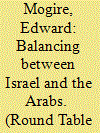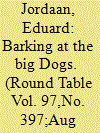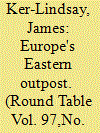|
|
|
Sort Order |
|
|
|
Items / Page
|
|
|
|
|
|
|
| Srl | Item |
| 1 |
ID:
084594


|
|
|
|
|
| Publication |
2008.
|
| Summary/Abstract |
This article attempts to illuminate Kenya-Middle East relations using a range of indicators such as trade, political-diplomatic interactions and Kenya's reaction to the Arab-Israel conflict. It examines the main factors underpinning this relationship and the form it is likely to take in the future. It shows that Kenya has strived to maintain relations with both the Arab-Islamic states and Israel. Although at the multilateral level Kenya's orientation tends to be pro-Arab, at the bilateral level it has maintained a close relationship with Israel. Kenya's foreign policy is non-alignment, support for African unity, and a radical orientation characterized by idealism as well as economic and security interests. Internal political imperatives, especially the Muslim influence, are the main factors underpinning Kenya-Middle East relations. While economic considerations will propel Kenya to strengthen its relations with Arab countries, security concerns, especially in the light of terrorist attacks, will ensure that relations with Israel will remain strong.
|
|
|
|
|
|
|
|
|
|
|
|
|
|
|
|
| 2 |
ID:
084593


|
|
|
|
|
| Publication |
2008.
|
| Summary/Abstract |
This article places South Africa's foreign policy towards the Middle East in the context of the country's general foreign policy. South Africa is classified as a middle power, given its penchant for international 'bridge-building' and multilateralism. With regard to the Middle East, South Africa has frequently offered itself as a mediator in the region's various conflicts and continues to do so. However, the argument proposed here is that there is an 'anti-imperialist' strain in South Africa's foreign policy that renders it unlikely to be regarded as an impartial broker in the various Middle East conflicts. South Africa's middle power proclivities, as well as its anti-imperialist tendencies, are demonstrated with regard to Iran's nuclear ambitions, the 2003 invasion of Iraq, the Israeli-Palestinian conflict, recent events involving Lebanon, and Hamas's 2006 electoral victory.
|
|
|
|
|
|
|
|
|
|
|
|
|
|
|
|
| 3 |
ID:
084591


|
|
|
|
|
| Publication |
2008.
|
| Summary/Abstract |
This article explores the relationship between the Republic of Cyprus and the Middle East. Although it is now a member of the European Union, geographically Cyprus was long viewed as a peripheral part of the Middle East. This has naturally created a certain ambiguity in terms of the relationship the island has with its regional neighbours. However, politics rather than geography has been the main force driving modern and contemporary relations. Throughout the Cold War, Cyprus was a member of the Non-Aligned Movement, along with many of the other countries of the region. Its relations with the region have also been shaped by its desire to prevent the Muslim Arab states from recognizing the Turkish Cypriot breakaway regime in northern Cyprus. In turn, these factors shaped Cyprus' views on a number of regional issues, including the Arab-Israeli conflict and the invasion of Iraq. Since it joined the EU, in May 2004, Cyprus has increasingly taken an equidistant approach on regional issues and increasingly sees itself as a bridge between Europe and the Middle East.
|
|
|
|
|
|
|
|
|
|
|
|
|
|
|
|
| 4 |
ID:
084599


|
|
|
|
|
| Publication |
2008.
|
| Summary/Abstract |
On 27 October 2007, five Malaysian civil society organizations collaborated to commemorate the 20th anniversary of Operasi Lalang. This police operation was sanctioned by the government in 1987 and saw 107 Malaysians, mainly opposition party members and activists, detained without trial for as long as two years. Operasi Lalang is regarded by many critics of the Malaysian government as the most egregious deployment of the repressive Internal Security Act, under which these detentions were made. This article examines the social and political impacts of the Internal Security Act and Operasi Lalang before describing the commemoration which was styled as a court hearing with the Internal Security Act as the accused. Evident at the commemoration was a comprehensive loss of faith in the infrastructures of the state that are supposed to carry out justice and protect the citizenry from abuses of power. Thus the commemoration-cum-trial declared guilt and took justice, rather than seeking it through infrastructures of the Malaysian state.
|
|
|
|
|
|
|
|
|
|
|
|
|
|
|
|
| 5 |
ID:
084597


|
|
|
|
|
| Publication |
2008.
|
| Summary/Abstract |
The Australian federal election of 24 November 2007 saw the defeat of the Howard Liberal-National Party coalition government after almost 12 years in office and brought to power a Labor government, the first since 1996, under the leadership of Kevin Rudd. John Howard, Australia's second longest-serving prime minister, became only the second prime minister to lose his own seat at an election. This article summarizes the election result and places it in the context of post-Second World War Australian political and electoral history. The highly unusual character of the large swing to the Labor Party is underlined, as is the rarity of a change of government in Australia since the Second World War. The article also examines the influence of the political leadership of the two major parties in contributing to the changing climate of opinion during 2007 and surveys the campaign itself, underlining the many problems experienced by the Howard government in the final weeks of its life. Finally, the article emphasizes the critical roles that interest rates, climate change and industrial relations all played in fatally undermining the Howard ascendancy. The government, faced with a politically credible and electorally attractive opponent, emerging economic difficulties and a shifting policy agenda, was unable to present itself as equipped to deal with new local and global challenges after a long period in power.
|
|
|
|
|
|
|
|
|
|
|
|
|
|
|
|
| 6 |
ID:
084589


|
|
|
|
|
| Publication |
2008.
|
| Summary/Abstract |
Prime Minister Jean Chr tien considered his decision to keep Canada out of the Iraq War of 2003 as the best of his tenure. That move challenges the previous record of Canada's participation in war with the two Commonwealth countries to which it is most often compared, Australia and the United Kingdom; it was also an apparent departure in relations with the United States. This article, in its first section, argues that the 'decision' was belated and incoherent, and also, relatedly, one that lacked sufficient grounding in Canadian foreign policy traditions. The article hypothesizes in its second section on foreign policy options, arguing further that the Canadian government was unconstrained by expectations of the United States but also that it could have made an essentially cost-free decision, and one tied into a defensible interpretation of Canadian foreign policy traditions.
|
|
|
|
|
|
|
|
|
|
|
|
|
|
|
|
| 7 |
ID:
084595


|
|
|
|
|
| Publication |
2008.
|
| Summary/Abstract |
Since the end of the Cold War India's policy towards developments in the Middle East has been governed more by economic and energy considerations and less by the political rhetoric of the past. This period has also witnessed the marginalization of the Pakistani factor in India's policy towards the region and a greater emphasis on economic partnership. Regarding Israel and the pro-western countries of the Gulf, India has forged a good working relationship. However, the United States has emerged as a player in India's Middle East policy. As is shown, US policy is limiting India's ability to forge closer ties with countries such as Iran and Iraq.
|
|
|
|
|
|
|
|
|
|
|
|
|
|
|
|
|
|
|
|
|